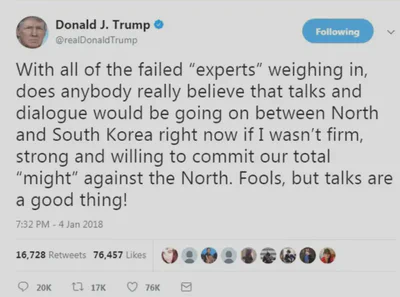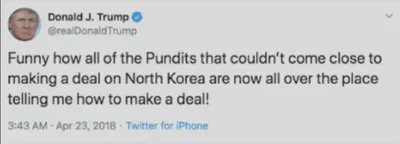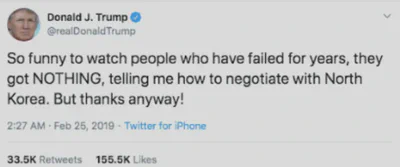Korea policy in the age of narcissism

It is a strange time to be a thinktank policy analyst in Washington. On one hand, the policy papers keep coming—well-researched, sober, often sensible attempts to offer realistic paths forward on North Korea and the ROKUS alliance. On the other hand, none of it matters. There’s a president who derides experts and only wants photo ops and an ATM.
This week has seen the release of two detailed policy papers by leading U.S. thinktanks.
The Quincy Institute’s recent essay, “Trump Could Get a Win With North Korea” propose that Trump could take a more modest, flexible approach toward North Korea, focusing on limited concessions and incremental progress.
The Carnegie Endowment’s comprehensive “Pursuing Stable Coexistence” outlines a detailed reorientation of U.S. North Korea policy—one that shifts away from the doomed all-or-nothing denuclearization demand and toward a more pragmatic framework of arms control, diplomacy, and risk reduction.
Both are thoughtful. Both are grounded in political realism. Both are written by people I respect and admire. Agree or disagree with the ideas - it doesn’t matter. Both are doomed to be ignored.
Why? Because these proposals assume the presence of a rational policymaking process. They operate in a world where strategy is driven by deliberation, not dopamine. They imagine a president who reads memos, values interagency input, and prioritizes outcomes over optics. In short, they make the mistake of assuming that American foreign policy is still shaped by policy.
But the Trump era—and perhaps the post-Trump era, too—does not operate on those terms. The presidency under Trump, is not a venue for crafting long-term strategic goals. It is a studio set with cheap fake tan make-up. And in that set, North Korea policy is not a diplomatic priority—it’s a performance piece.
Trump’s North Korea summits were never about a coherent approach to nuclear diplomacy. They were about optics: the handshake, the demilitarized zone photo-op, the declarations of personal chemistry with a dictator. There was no plan behind the spectacle—just a craving for applause (others did plan, and tried, but they were ultimately sidelined).

While think tanks pored over what confidence-building measures might work or what sanctions could be lifted in exchange for a testing freeze, the White House was more interested in whether the press would run the image above the fold.
This is the heart of the problem. No matter how smart the policy recommendation, it cannot survive contact with a political culture that has grown allergic to complexity.
In Trump’s orbit, ideas aren’t weighed—they’re waved around, cherry-picked for punchlines, or discarded entirely if they don’t produce a bump in approval ratings or television coverage. Serious diplomacy requires slow, incremental work. Trump operates in 12-hour news cycles punctuated by the number of likes on each tweet.
Even worse, policy is not merely ignored—it is actively undermined. During Trump’s first term, national security staff were routinely sidelined, alliances second-guessed on Twitter, and Cabinet officials forced to contradict themselves in real time. A think tank proposal that hinges on diplomatic consistency or interagency coordination is laughably out of place in this context. Policy doesn’t shape behavior—ego does.

What we face at the moment is a case of policy denial. Policy thinkers in Washington think tanks resemble patients in a state of clinical denial—clinging to rational frameworks and meticulously argued proposals as if the political system still functions according to reason and institutional process. Like someone refusing to accept a terminal diagnosis, they continue to draft 30-page white papers under the belief that if they just calibrate the language or massage the recommendations enough, someone in power will listen.
In psychological terms, denial is a defense mechanism to avoid pain—and in this case, the pain is the irrelevance of their expertise in an age dominated by spectacle, ego, and impulsive showmanship. The tragedy is not just that these thinkers are ignored; it’s that many of them still believe they’re being taken seriously.
The result will be policy nihilism. Analysts write with care. They do their due diligence. They build proposals around strategic interests, risk mitigation, and regional stability. But when narcissistic leadership defines success by cable news appearances and crowd size, the analytical effort is just fuel for the fire. It gives the illusion that someone, somewhere, is taking things seriously—when in fact, the machinery of statecraft has been hijacked by a media spectacle.

This isn’t to say policy analysis is worthless. It isn’t. Importantly, they document the road not taken. It preserves institutional memory. It equips future administrations with options. But it is powerless in the face of performative politics. Trump doesn’t read Quincy papers. He watches Fox & Friends. He doesn’t consult Carnegie reports. He consults the nearest sycophant.
In a healthy political system, policy papers shape strategy. In the Trump system, they decorate the backdrop of a political reality show.
So yes, North Korea policy needs reorientation. Yes, coexistence is more plausible than denuclearization. And yes, incremental deals and confidence-building measures are smarter than maximalist demands. But none of it matters if the president would rather talk about how “we fell in love” with Kim Jong Un than do the real work of diplomacy.
Until political leadership values policy more than applause, all the good ideas in the world will go nowhere. They will gather dust in think tank archives—testaments to a time when people still believed ideas could matter.
